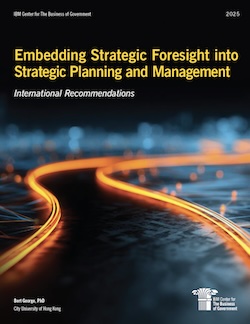
Embedding Strategic Foresight into Strategic Planning and Management

In an age of accelerating change and unprecedented complexity, governments worldwide face the formidable challenge of governing not just for today, but for tomorrow. These challenges underscore a fundamental truth: reactive governance is no longer sufficient. Public leaders must anticipate, prepare, and adapt to emerging realities with unprecedented speed and sophistication.
Professor Bert George's timely report addresses one of the most critical gaps in contemporary public administration: the disconnect between strategic foresight activities and the ongoing strategic planning and management processes that drive government decision-making. While many governments have embraced strategic foresight tools and established dedicated futures units, too often these efforts remain isolated from the core machinery of government strategy. This isolation not only limits the impact of foresight work but also diminishes the forward-looking capacity of strategic planning itself.
The research presented here offers something rare in the field of public administration: concrete, evidence-based guidance drawn from successful practice across diverse governmental contexts. By analyzing strategic foresight initiatives in Flanders, Singapore, the European Union, and the United States, Professor George demonstrates that effective integration is not only possible but essential for building governmental resilience and effectiveness.
What makes this report particularly valuable is its systems perspective. Rather than advocating for specific foresight tools or techniques, the analysis focuses on the foundational elements that enable sustainable integration: governance structures that connect foresight to strategy, capabilities that span both domains, processes that embed future-thinking into planning cycles, and practices that ensure relevance to real-world decision-making.
The recommendations contained within this report reflect insights from practitioners who have navigated the complex terrain of embedding foresight into government operations. They acknowledge the political realities, resource constraints, and organizational dynamics that shape public sector innovation. Most importantly, they recognize that successful integration requires sustained commitment and continuous adaptation rather than one-time implementation.
For public administrators, policymakers, and researchers interested in strengthening the government’s capacity to anticipate and respond to future challenges, this report provides invaluable recommendations and insights. It demonstrates that when strategic foresight and strategic planning work in concert, they create a powerful engine for adaptive governance—one that our increasingly complex world desperately needs.
The report builds on multiple IBM Center reports that highlight tools and strategies that work to help government leaders navigate uncertainty and more effectively anticipate the unexpected, including Addressing Complex and Cross-Boundary Challenges in Government: The Value of Strategy Mapping; Preparing Governments for Future Shocks; A Guide to Adaptive Government: Preparing for Disruption.
The IBM Center for The Business of Government is proud to support research that bridges the gap between academic insight and practical application. Professor George's work exemplifies this mission, offering evidence-based recommendations that can help governments at all levels build more resilient, forward-looking institutions capable of serving citizens not just today, but in the decades to come.



